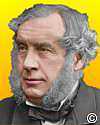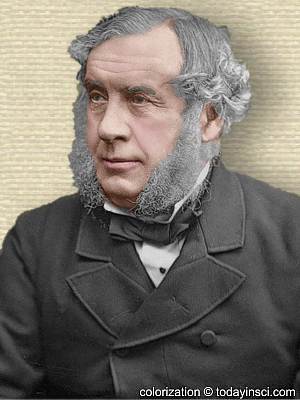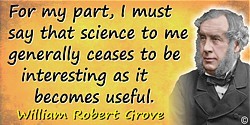 (source)
(source)
|
Sir William Robert Grove
(11 Jul 1811 - 1 Aug 1896)
Welsh physicist who offered the first proof of the thermal dissociation of atoms within a molecule. He produced hydrogen and oxygen from steam passed over strongly heated platinum wire.
|
Address on the recollections of the state of chemistry at the time of the foundation of the Chemical Society.
CHEMICAL SOCIETY’S JUBILEE
by Sir William Richard Grove
from Nature (1891)
[p.492] My qualification for being here this afternoon is not one of great distinction. It is that of old age, and the privileges of old age are such as nobody envies. With old age come impaired faculties, and one of its effects is loss of memory. When I promised to take part in this celebration I thought that I should have some reminiscences of my early connection with it to bring before you; but when I came to look up the subject I found that my recollections of it were but slender. So that although, as I have said, my main qualification is that of old age—a sort of survival of the unfittest—I am afraid that I shall not be able to assist you very much.¶
Still I do remember some few incidents of the early formation of the Society. I do not remember who was the actual initiator of it; but the most active man in its formation was undoubtedly Prof. Graham. There was a good deal of discussion as to who should be the first President of the Society. We were anxious to get a man of considerable distinction; and I spoke to Faraday. But he thought that he could do more good in research than in assisting in the construction of such a body; and so he declined the honour. Then the matter gradually advanced, until we got the names which appear in the charter of the Society as its original members. Among those names the only ones that I can now recognize are those of my old and good friend Sir Lyon Playfair, Prof. Graham, and my own.¶
After considerable discussion it was agreed that Prof. Graham should be invited to become President, and he accepted. I think that Mr. Phillips’s name was previously suggested, but he declined, and proposed Prof. Graham. However, among the names I do not recognize more than those I have mentioned.¶
I am surprised not to see one name among them. Perhaps he was then too young: but he afterwards took an active part in the Society. I refer to Jacob Bell, a very able, gentlemanly, and agreeable man, and also a good chemist. He was the means of introducing into this country the system of selling pure drugs.¶
I could wish that my memory enabled me to tell you more about the origin of the Society; but I do not know that I can give you much information. There were of course discussions among the best chemists of the day. The name of Dalton has been mentioned by our President.¶
I was present at the lecture which Dalton gave at the Royal Institution upon the atomic theory. He was then somewhat aged, of great simplicity of character, and thoroughly devoted to his subject. I well recollect the paper, and his drawings of atoms— little circles to represent atoms as minute spheres grouped together to show their action in uniting to form a molecule of a body. Illustrations were given of the [p.493] combinations of nitrogen and oxygen, the spheres being arranged in symmetrical little groups around one central sphere.¶
The most compact forms consisted of six spheres around one, for in that case they all touch, and thus pressed together give us a hexagon, as shown in the honeycomb, to the explanation of which a great deal of mathematics has been devoted. I have no doubt that it is caused by the pressure of the bees in crowding into the honeycomb; for each bee with closed wings being cylindrical or nearly so, and somewhat elastic, they convert the spherical cylinders which they make into hexagons by mutual pressure. Conversely you will find that pressure from without acts in the same way, as by winding a band round a bundle of soft clay tubes and gradually tightening it the tubes become hexagons.¶
I think the name atomic theory was an unfortunate one. We talk fluently about atoms as the smallest particles that exist, and chemists regard them as indivisible in the sense of being so hard as to be incapable of further division. To my mind the infinitely small is as incomprehensible as the infinitely great. I use the word incomprehensible advisedly. I do not say that you may not believe in the infinity of the universe ; but we cannot comprehend it, we cannot take it in. And so with the atom. Therefore I think that it would have been better to have taken a different word—say minim—which would have been a safer term than atom. As it is, different people think differently as to what an atom really is. However, that was Dalton’s theory, deduced from the definite proportions of combining bodies, which is now universally regarded as the keystone of the constitution of matter enabling us to comprehend its combination into definite masses.¶
After the elaborate survey you have just heard from our President, I will not attempt anything approaching to a summary of the chemical discoveries made during the lifetime of the Society; the more so as you can get them in the Standard of this morning, or at any rate a very large number of them.¶
There are two ways of regarding science: first, as seeking natural revelations; secondly, practically, as applied to the arts and industries. For my own part, I must say that science to me generally ceases to be interesting as it becomes useful.¶
Englishmen have a great liking for the practical power of science. I like it as a means of extending our knowledge beyond its ordinary grasp, leading us to know more of the mysteries of the universe. The little we can see of it even telescopically is a mere nothing, while what we call an atom is gigantic if its divisibility is infinite.
The spectroscope has been discovered during the lifetime of our Society; and I ought to have been its discoverer. I had observed that there were different lines exhibited in the spectra of different metals when ignited in the voltaic arc; and if I had had any reasonable amount of wit I ought to have seen the converse, viz., that by ignition different bodies show in their spectral lines the materials of which they are formed. If that thought had occured to my mind, I should have discovered the spectroscope before Kirchoff; but it didn’t.¶
I cannot recall to my mind any further points sufficiently interesting to speak to you about.¶
Alphonse of Castile is reported to have said that if he had had the making of the universe he would have done it much better. And I think so too. Instead of making a man go through the degradation of faculties and death, he should continually improve with age, and then be translated from this world to a superior planet, where he should begin life with the knowledge gained here, and so on. That would be to my mind, as an old man, a more satisfactory way of conducting affairs. However, it is not so, and we must put up with things as they are.¶
I have been sometimes reproached for having to a great extent given up science for my profession. I need not say that I should have preferred the former. But the necessities of a then large family gradually forced me to follow a more lucrative pursuit. I have said that I prefer contemplative science to science applied to the arts; we are overdone with artificial wants, and life becomes in consequence a constant embarrassment.¶
But there is one practical problem which I would venture to urge upon the attention of the members of this Society: and that is that they should endeavour to prevent the existence of London fogs, even under a constitutional and representative Government.
- Science Quotes by Sir William Robert Grove.
- 11 Jul - short biography, births, deaths and events on date of Grove's birth.






